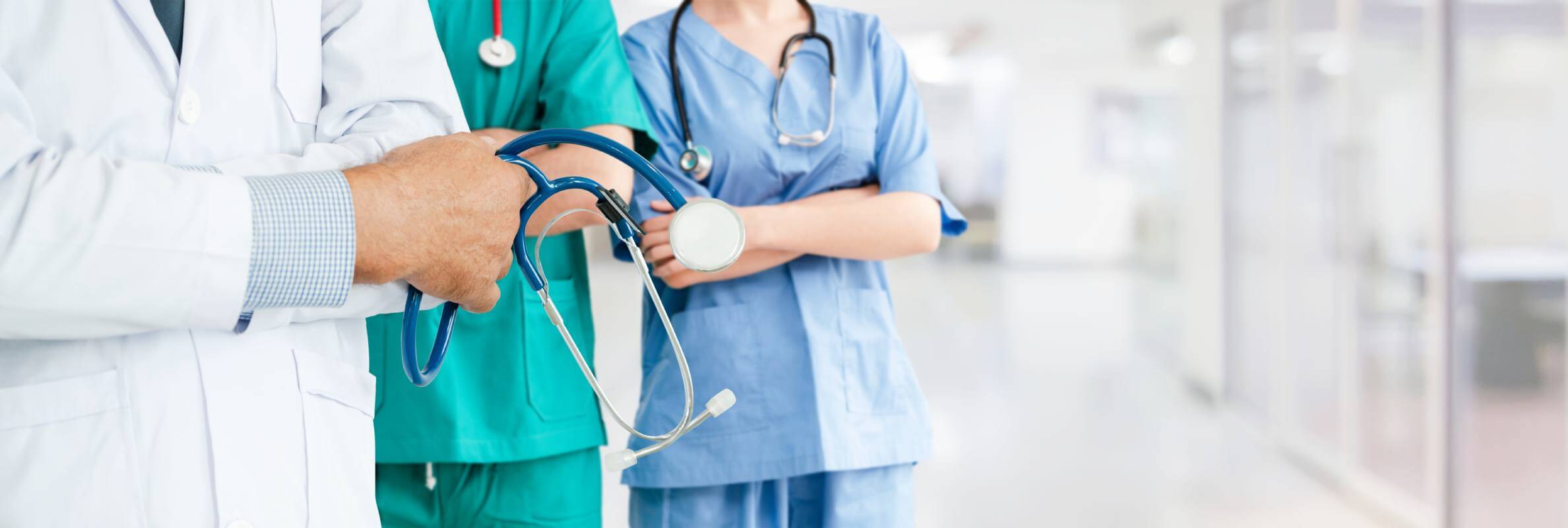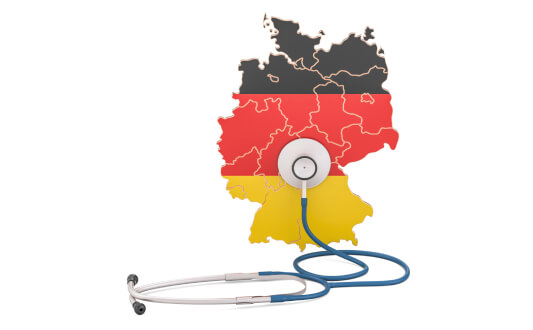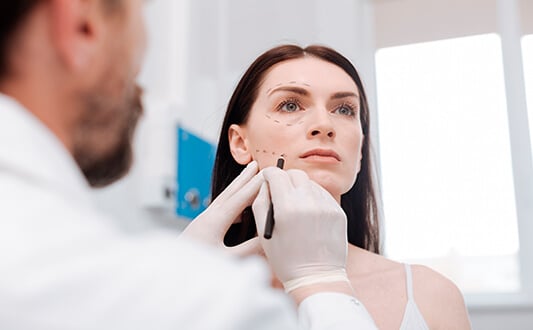Hidradenitis suppurativa (HS) is a chronic recurrent disease associated with inflammation of the apocrine sweat glands. The inflammatory process primarily affects hair follicles and then spreads to the apocrine glands. The disease poorly responds to treatment. Hidradenitis suppurativa has a high prevalence affecting 1-4% of the population in various countries.
Content
- Disease characteristics
- Medicamentous and local treatment
- Surgery
- Benefits of treatment in Germany
- Hospitals and cost of treatment
- Organization of treatment in Germany
Disease characteristics
Inflammation of sweat glands is caused by bacteria. However, all people have bacteria on their skin, but only some have hidradenitis. The disease develops when predisposing and triggering factors are present.
The major risk factors are:
- Female gender
- Heredity
- Use of hormonal contraceptives
- Smoking
- Diabetes
- Obesity
Being overweight is a proven risk factor for hidradenitis suppurativa. The more obese a person is, the more severe form of the hidradenitis suppurativa he risks having.
Microfissures of the skin seems to be the triggering factors of the process. This is confirmed by the fact that hidradenitis occurs predominantly in the areas of high mechanical load (that are exposed to constant friction). Disruption of the epithelial barrier allows bacteria to penetrate the dermis.
The most commonly affected areas include:
- Armpits
- Groin folds
In women, the skin under the breasts or on the inner thighs also becomes involved. In men, the process can affect the perianal zone, perineum, thorax and the area behind the ears.
In the zone of inflammation, deep painful abscesses occur. Nearby lymph nodes become enlarged. Skin lesions leak pus, which can cause an unpleasant smell. Often, patients have hyperhidrosis or excessive sweating.
Although women are four times more likely to develop the disease, it is more severe in men. There are three clinical stages of hidradenitis suppurativa:
- Formation of lumps or abscesses. They are solitary or multiple, without fistulas and do not cause scarring.
- Relapses of hidradenitis result in the formation of fistulas and scarring. As a rule, these hypertrophic scars protrude above the skin level.
- Multiple abscesses, fistulas and scars develop. Large areas of skin are affected.
In Germany, the disease stage and severity are defined using the Sartorius staging system. It is based on the anatomical regions involved, the distance between lesions, and the presence of healthy skin in between lesions.
Hidradenitis suppurativa has a high tendency to recur. It is not only unpleasant but also dangerous due to its complications. The disease can lead to osteomyelitis, sepsis, and squamous cell skin carcinoma. Moreover, such carcinomas have a high degree of malignancy and metastasize quickly.
Medicamentous and local treatment
Treatment of hidradenitis suppurativa starts with topical and systemic medications. There are more than 30 treatment schemes, but none of them is generally accepted. For topical treatment, various drugs with antibacterial effects (silver-containing drugs, antibiotics, benzoyl peroxide, adapalene etc.) can be used.
Other types of local treatment:
- Laser
- Photodynamic therapy
- Cryosurgery
- Injection of botulinum toxin
- Resorcinol peel
- Irradiation
Newly diagnosed patients are usually treated with antibiotics. In order to alleviate pain and inflammation, oral nonsteroidal anti-inflammatory drugs can be prescribed. Triamcinolone injections into the focus of inflammation can also be recommended.
A person should not wear tight or too warm clothes and shave the area of inflammation. An antibacterial soap reduces the risk of relapse. For women, estrogens can be recommended.
Clindamycin is the most commonly used topical antibiotic treatment. Systemic antibiotic therapy (rifampicin, tetracycline, clindamycin, minocycline) can also be prescribed.
Adjuvant treatment:
- Glucocorticoids to suppress the inflammatory response
- Immunostimulators to reduce the risk of relapse
- Antiandrogens (for men) to reduce sebum excretion
- Topical xylocaine to eliminate pain
Physiotherapeutic procedures are used as an addition to other methods of treatment. They increase the effectiveness of conservative therapy or contribute to the recovery of patients after surgery.
Surgery
Often patients need surgical treatment. It is indicated in recurrent, severe or complicated hidradenitis. The formation of fistulas is also an indication of surgical treatment.
Long-existing hidradenitis increases the risk of complications, which include:
- Fistula formation
- Phlegmon
- Abscesses
- Septic complications
- Development of a malignant tumor, especially when hidradenitis affects the buttocks and perineum
For most pustular skin lesions, surgery is performed to open the abscess and drain it. However, in the case of hidradenitis suppurativa, this approach is ineffective. Here, an incision of the abscess can first attenuate the inflammation, but after some time, exacerbation follows. The problem is that some apocrine sweat glands involved in the inflammatory process remain intact at the opening of the abscess. Therefore, hidradenitis continues to progress despite the operation.
Radical surgery involves the removal of all affected skin. It is carried out in two stages. In the first stage, a wide incision is made to remove pus and all affected subcutaneous adipose tissues. Then the wound is treated with the open method. Antibiotics are administered to prevent infection.
When the inflammatory process subsides, and the first granulations appear, the second stage of treatment is performed. Skin and subcutaneous adipose tissues are removed within the whole area that is constantly affected by the inflammation. As a result, a significant skin defect is formed. Therefore, skin reconstruction is required. A skin graft with the patient’s own skin flaps may be used to close the wound.
One-stage surgery of hidradenitis is not performed, while it can cause severe purulent processes with the formation of disfiguring scars. If the plastic intervention is done immediately following the skin removal, the transplanted skin will also be involved in the inflammatory process. Therefore, the bacterial infection needs to be completely suppressed at first, and only then the skin defects can be closed.
Benefits of treatment in Germany
In Germany, hidradenitis suppurativa is treated according to modern standards, in compliance with the principles of evidence-based medicine. This is an advantage of German medicine over the health system of other countries. Most of the existing schemes of hidradenitis treatment are not supported by sufficient evidence. On the opposite, in Germany, only those schemes are used that have proven their effectiveness in clinical trials.
German doctors do not limit treatment of hidradenitis to standard antibiotics administration in combination with anti-inflammatory agents. They also use other methods of the conservative treatment that are highly effective in certain clinical situations.
In addition to antibiotics, monoclonal antibodies can be used. Biological preparations act by binding the tumor necrosis factor-alpha, which is released in excessive amounts in response to any bacterial skin lesion. Tumor necrosis factor-alpha blockers provide remissions of up to 3 months. Even in severe cases of hidradenitis, it is possible to achieve full recovery in 15% of patients and a significant improvement – in 50% of patients.
In different indications, the following treatment options can be applied:
- Physiotherapy methods
- Laser therapy
- Irradiation of the chronic suppurative inflammation area
- Photodynamic therapy
The most effective method of treatment is surgery. Many people seek treatment in Germany, as surgery is maximally safe and effective here.
Advantages of the operation in a German clinic:
- Experienced, highly qualified doctors, rated among the best specialists in the world
- Well-equipped operating rooms
- High-precision diagnostics that allow delineating the affected skin area with inflamed sweat glands accurately
- Use of the modern surgical techniques
- High quality postoperative care
- Adequate care in all clinical situations
In Germany, postoperative complications are much rarer than in developing countries. Here the percentage of recovery is higher. The vast majority of patients don’t have relapses of hidradenitis after the operation.
In German clinics, doctors aim not only to cure the disease but also to ensure a good aesthetic result. All skin defects are replaced by skin flaps from donor sites. A high level of plastic surgery prevents the formation of large postoperative scars and other aesthetic defects.
Hospitals and cost of treatment
The highest success rates in the treatment of hidradenitis suppurativa in adults and children are demonstrated by the following hospitals:
- University Hospital of Ludwig-Maximilian University of Munich, Department of Hand Surgery, Plastic and Aesthetic Surgery
- University Hospital Erlangen, Department of Plastic Surgery, Adult and Pediatric Hand Surgery
- University Hospital Jena, Department of Adult and Pediatric Oral, Maxillofacial and Plastic Surgery
- University Hospital Rechts der Isar Munich, Department of Plastic Surgery and Hand Surgery
- University Hospital RWTH Aachen, Department of Plastic, Burn Surgery and Hand Surgery
The average costs of examination and treatment for hidradenitis suppurativa are as follows:
- Examination for suspected hidradenitis suppurativa – €2,101
- Radical excision of the outer layer of the skin followed by plastic reconstruction in hidradenitis suppurativa – €20,254
- Rehabilitation after the completion of the main course of treatment – €1,032 per day
If necessary, not only dermatologists and surgeons but also specialists in other fields of medicine are involved in the treatment of hidradenitis.
Organization of treatment in Germany
If you want to come for treatment in this country, the best option will be to use the services of Booking Health. We cooperate with the best clinics in Germany. We have direct contracts with them. This allows you to enjoy all the benefits of our cooperation, among which the following should be mentioned:
- Choosing the right clinic in Germany. We will select for you a clinic with the best statistics on the treatment of hidradenitis and other skin infections.
- Establishing communication with your doctor.
- Elaboration of a treatment program based on the results of previously performed diagnostic examinations. All medical reports will be translated into German, thus avoiding the repetition of the same diagnostic procedures.
- The cost of treatment for you will be reduced, as we will negotiate on the exclusion of additional fees and coefficients for non-resident patients.
- We will book an appointment on the desired date.
- Our experts will monitor the program at all stages.
- If necessary, we will help you with the purchase of medicines and their shipment abroad.
- Clear financial control and return of all unspent funds.
- Organization of additional examinations.
Employees of Booking Health will provide you with high-level services. We will help you prepare documents for traveling abroad and select and book a hotel and air tickets. In Germany, we will meet you at the airport and take you to the clinic. You will be accompanied by a translator, who will help you find a common language with the medical staff of the clinic.
Choose treatment abroad and you will for sure get the best results!
The Booking Health portal presents 47 German clinics specializing in treatment of Hidradenitis Suppurativa
Authors:
The article was edited by medical experts, board certified doctors Dr. Vadim Zhiliuk, Dr. Nadezhda Ivanisova. For the treatment of the conditions referred to in the article, you must consult a doctor; the information in the article is not intended for self-medication!
Sources:
National Center for Biotechnology
Read:
Why Booking Health - questions and answers
How to make right decision when choosing the clinic and specialist
7 reasons to trust to the rating of clinics on the Booking Health portal
Don't know where to start?
Contact Booking Health







